Related Research Articles
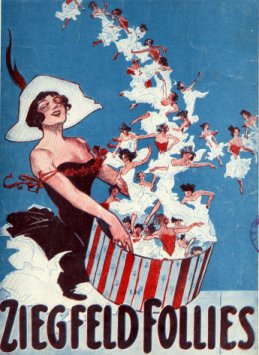
The Ziegfeld Follies were a series of elaborate theatrical revue productions on Broadway in New York City from 1907 to 1931, with renewals in 1934, 1936, 1943, and 1957. They became a radio program in 1932 and 1936 as The Ziegfeld Follies of the Air.
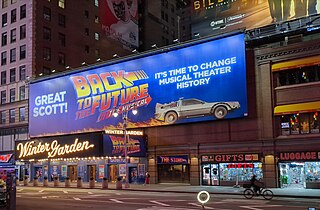
The Winter Garden Theatre is a Broadway theatre at 1634 Broadway in the Midtown Manhattan neighborhood of New York City. Originally designed by architect William Albert Swasey, it opened in 1911. The Winter Garden's current design dates to 1922, when it was completely remodeled by Herbert J. Krapp. Due to the size of its auditorium, stage, and backstage facilities, it is favored for large musical productions. It has 1,600 seats and is operated by The Shubert Organization. The auditorium interior is a New York City landmark.

Harry Bache Smith was a writer, lyricist and composer. The most prolific of all American stage writers, he is said to have written over 300 librettos and more than 6000 lyrics. Some of his best-known works were librettos for the composers Victor Herbert and Reginald De Koven. He also wrote the book or lyrics for several versions of the Ziegfeld Follies.
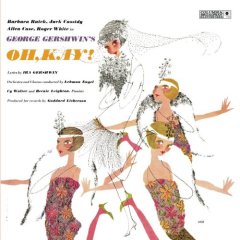
Oh, Kay! is a musical with music by George Gershwin, lyrics by Ira Gershwin, and a book by Guy Bolton and P. G. Wodehouse. It is based on the play La Présidente by Maurice Hennequin and Pierre Veber. The plot revolves around the adventures of the Duke of Durham and his sister, Lady Kay, English bootleggers in Prohibition Era America. Kay finds herself falling in love with a man who seems unavailable. The show is remembered for its enduring song, "Someone to Watch Over Me".

John Joseph Francis Mulhall was an American film actor beginning in the silent film era who successfully transitioned to sound films, appearing in over 430 films in a career spanning 50 years.

The Passing Show of 1918 is a Broadway musical revue featuring music of Sigmund Romberg and Jean Schwartz, with book and lyrics by Harold Atteridge. The show introduced the hit songs "I'm Forever Blowing Bubbles" and "Smiles".
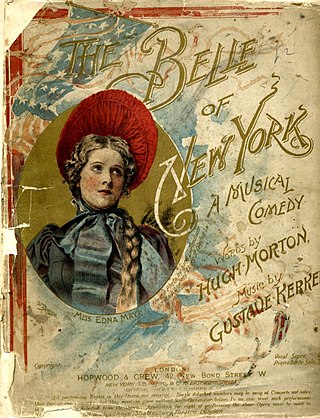
The Belle of New York is a musical comedy in two acts, with book and lyrics by Hugh Morton and music by Gustave Kerker, about a Salvation Army girl who reforms a spendthrift, makes a great sacrifice and finds true love.
Louis Achille Hirsch, also known as Louis A. Hirsch and Lou Hirsch, was an American composer of songs and musicals in the early 20th century.
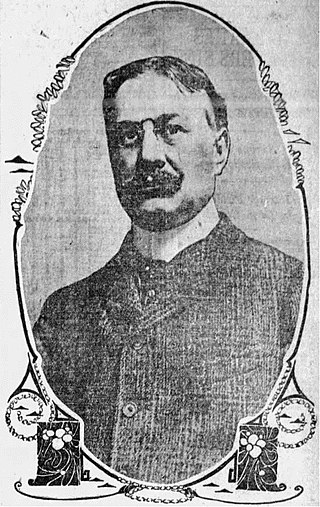
Gustave Adolph Kerker, sometimes given as Gustav or Gustavus Kerker, was a Kingdom of Prussia-born composer and conductor who spent most of his life in the United States. He became a musical director for Broadway theatre productions and wrote the music for a series of operettas and musicals produced on Broadway and in the West End. His most famous musical was The Belle of New York (1897).
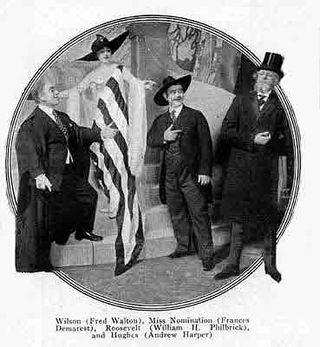
The Passing Show of 1916 is a revue featuring the music of Sigmund Romberg and Otto Motzan, with book and lyrics by Harold Atteridge. It included the first George Gershwin songs introduced in a Broadway show.

Morton Selten was a British stage and film actor. He was occasionally credited as Morton Selton.
Hitchy-Koo of 1919 is a musical revue with music and lyrics by Cole Porter and a book by George V. Hobart. This revue was third in a series of four Hitchy-Koo Broadway revues from 1917 to 1920 produced by, and starring, Raymond Hitchcock. The revues were named after the 1912 popular song "Hitchy-Koo" by composers Lewis F. Muir and Maurice Abrahams with lyrics by L. Wolfe Gilbert; the only song which was featured in all of the Hitchy-Koo revues. The original Broadway production of this version played in 1919. The revue received favourable reviews.

J. Harold Murray was an American baritone singer and actor. For more than a decade, during the Roaring Twenties and the Depression Thirties, he contributed to the development of musical theater by bridging vaudeville, operetta and the modern American musical. The most popular American songs he introduced on Broadway included "Autumn in New York" ; "Let's Have Another Cup of Coffee" and "Soft Lights and Sweet Music" ; "Rio Rita", "The Kinkajou" and "The Rangers Song" ; and "Mandalay".
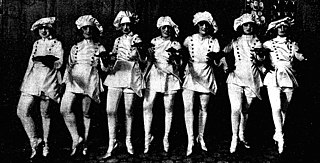
The Whirl of New York is a Broadway musical that premiered at Winter Garden Theatre on June 13, 1921. It was an expanded and substantially re-worked version of The Belle of New York. The show was billed not as a revival but as "founded on The Belle of New York.". The new version had music by Gustave Kerker, Al Goodman and Lew Pollack; book and lyrics by Hugh Morton and Edgar Smith; additional music by Leo Edwards; and additional lyrics by Sidney D Mitchell, Cyrus Wood and Cliff Friend. It opened to favourable reviews and ran for 124 performances.
Harold Richard Atteridge was an American composer, librettist and lyricist primarily for musicals and revues. He wrote the book and lyrics for over 20 musicals and revues for the Shubert family, including several iterations of The Passing Show.

Willie Howard and Eugene Howard, billed as the Howard Brothers, were Silesian-born American vaudeville performers of the first half of the 20th century. They were two of the earliest openly Jewish performers on the American stage.
Jesse C. Huffman (1869–1935) was an American theatrical director. Between 1906 and 1932 he directed or staged over 200 shows, mostly for the Shubert Brothers. Many of them were musical revues, musicals or operettas. He is known for The Passing Show series of revues that he staged from 1914 to 1924 at the Winter Garden Theatre on Broadway, daring alternatives to the Ziegfeld Follies.
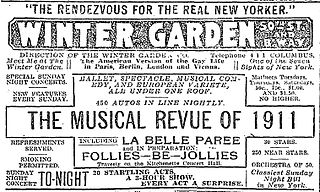
La Belle Paree was a musical revue that launched the legitimate theatre career of Al Jolson. The book was by Edgar Smith, music by Jerome Kern and Frank Tours and lyrics by Edward Madden. Billee Taylor provided additional music and lyrics, and M. E. Rourke and Frederick Day provided additional lyrics. It premiered on Broadway in 1911. The musical is set in Paris, France.
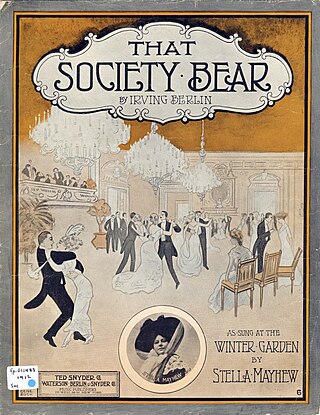
The Whirl of Society was a satirical Broadway musical that played at the Winter Garden Theatre from March 5 to June 29, 1912. Louis Hirsch composed the music with lyrics by Harold Atteridge, to a book by Harrison Rhodes. The production also featured songs by Arthur Fields. The Whirl of Society was part of a production also featuring Sesostra and A Night with the Pierrots, for 136 productions. The musical is set in New York City and takes place in the drawing room and ball room of Mrs. Dean.

Stella Mayhew was an American actress and vaudeville performer.
References
- 1 2 "BRILLIANT SHOW AT THE WINTER GARDEN; Color, Dance, Song, and Fun, with an Added Touch of Effective Spectacle". The New York Times . January 11, 1914. p. 15.
- 1 2 Dan Dietz (2021). "The Whirl of the World". The Complete Book of 1910s Broadway Musicals. Rowman & Littlefield Publishers. pp. 253–254. ISBN 9781538150283.